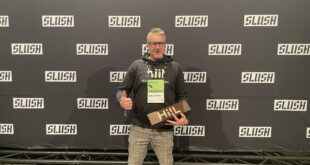You just saw a really cool TED talk on, say lab-grown organs, and want to learn more about it, but you don’t know anything about biotechnology. Google scholar would be a good place to start – if you knew the right keywords to search for. Enter Iris.AI.
Iris.AI can use the TED talk as input and find exactly what you’re looking for.
Iris.AI is a company that “aims to make scientific research fast and easy, even if you’re a total non-expert.”
The ultimate goal of Iris AI is to build an artificial intelligence capable of highlighting new trends and interconnections of discoveries to help knowledge seekers connect the dots.
Even if the science behind your interest area is completely inscrutable to non-experts, the AI- trained methodology helps you search using all sorts of different inputs, so you can instantly access and navigate the research of your interest.
The company was first established at Singularity University in 2015, where founder Anita Schjøll Brede was one of the first Norwegians to complete the program. She now runs the Singularity University’s Global Impact Competition for Norway.
Though this sounds innocuous, the movement to democratize access to scientific research is remarkably controversial. The “Open Access” debate has been raging in scholarly circles for the past few years. Perhaps the most widely-known embodiment of the movement was the arrest and subsequent suicide of Reddit co-founder Aaron Swartz, who was caught illegally downloading articles from the research database JSTOR.
Founder Anita Schjøll Brede feels that making scientific research more accessible is a simple matter of better knowledge-sharing, which will be “immensely beneficial”.
“Our starting point was, scientific research is really hard to find. It is inaccessible. How do we solve that? we looked at all the different problems of research, the distribution, the way you interact, how you find it. We reviewed the whole space with the goal of making it democratized and more accessible. And what we found is that there are millions of papers out there, but you can’t find them. And the idea came along to use AI as a way to overcome this.”
Fear of AI
Open access isn’t the only controversial aspect of Iris.AI. AI has been a tech “bogeyman” since it first started coming into use, as people fear it will take over their jobs – or worse.
“There’s a group of people that are scared of AI because they watched terminator,” says Anita.
But in the real-world, AI companies have been focused on specific tasks – feeding your pets, scheduling meetings, and detecting languages. Which is exactly what Iris.AI is doing.
“We are building a very narrow AI that does one thing: she knows how to read science, and tell you about other science related to it.”
And the fear of AI taking destroying jobs is exaggerated. The World Economic Forum recently reported that AI is expected to deliver net job growth by 2020. Anita is only positive about the vast potential for AI.
“It is not just about AI taking our jobs, but about saving our lives, making your life quality better, so, for example, that those billions of people who don’t have access to healthcare, can get access to healthcare.”
However, she acknowledges that it is important to talk about the issues surrounding AI, and the inevitable changes this technology will bring.
“So many people are using AI technologies for good, so yes there will be a painful process where jobs change, but the world is getting radically better by the hour.”
“I’m not worried, but we need to have these discussions, and a better understanding of what it really is. It’s just a computer program.”
 Nordic Startup News Early Stage Startup News From The Nordics
Nordic Startup News Early Stage Startup News From The Nordics


